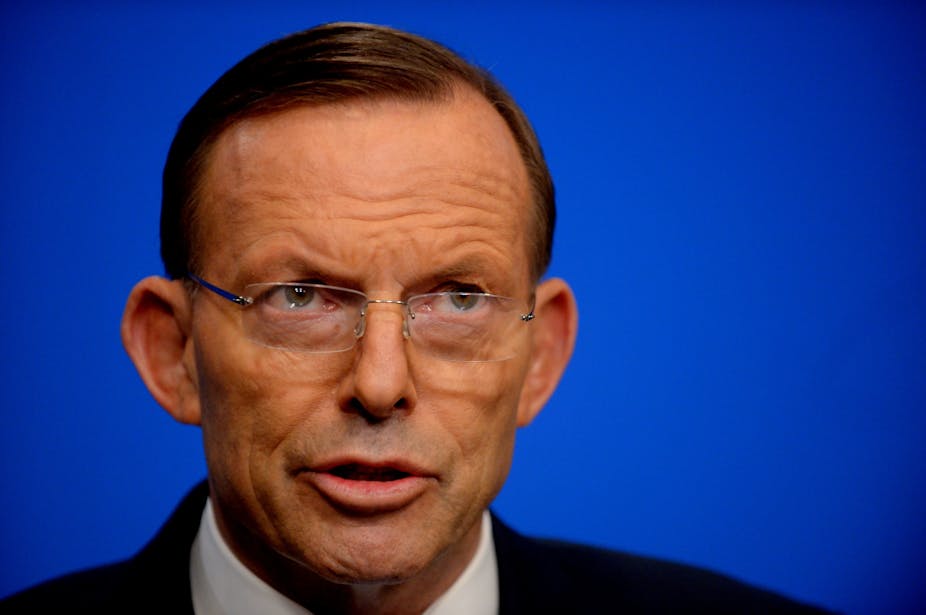A week ago Tony Abbott caught the mood of the nation when he quickly adopted the toughest rhetoric in denouncing those responsible for downing MH17, with the loss of many Australian lives.
A week later, the Prime Minister has moved for Australia to have a role in an international team securing the crash site, by pre-deploying 50 police to London.
In the days between, the government has operated at high speed diplomatically, and sent a large team of Australians to places on the ground.
Its temporary seat on the United Nations Security Council gave Australia the opportunity to sponsor and promote the strong resolution, eventually supported unanimously, calling on “all states and actors in the region” to co-operate with a full and independent international investigation, including by immediate and unrestricted access to the site. Foreign Minister Julie Bishop won much praise (including from Dutch Foreign Minister Frans Timmermans) for her successful lobbying.
After the UN vote Bishop, in an extraordinary week of gruelling travel, flew to the Netherlands for the arrival of the first of the bodies. From there she and Timmermans went to Kiev, where her brief was to discuss the resolution’s implementation in relation to securing the site. This would involve a memorandum of understanding with the Ukrainian government.
Abbott sent high profile former defence chief Angus Houston to Ukraine as his special envoy. Overall there are some 200 Australian officials on the ground (aside from the 50 police). To Kiev went Foreign Affairs department staff (consular, policy, support), police, Australian Transport Safety Bureau investigators, and defence personnel. Sent to Kharkiv were police (for victim identification) and Foreign Affairs and Defence officials, while Foreign Affairs, police and Defence personnel went to the Netherlands.
Governor-General Peter Cosgrove was dispatched to the Netherlands for the arrival of the bodies of victims, some of them transported by an Australian military aircraft.
Cabinet’s national security committee has convened daily, with some ministers patched in. Abbott has spent his nights on the phone to a raft of leaders, including two conversations with Russian President Vladimir Putin.
A tragedy is a special, dreadful, galvanising time for a country, and a major test of a leader, who must simultaneously embody the grief and emotion and display cool-headed decisiveness. Abbott has been determined to leave nothing undone in meeting the challenge.
We’ve seen the pastoral side (he did train for some time to be a priest); the blunt talker (going in hard within hours of the news); and the pragmatist (who knows he must tread a careful line in relation to Putin, to help secure his immediate co-operation and to keep open the question of his presence at the G20).
In arrangements to secure the area, the Netherlands would be the lead player, as it is in the investigation itself. A Dutch news site reported that “the Netherlands has begun a major diplomatic offensive to send possibly hundreds of soldiers and police forensic experts to Ukraine to investigate the downing … Ministers reportedly discussed the plan in a 2.5 hour meeting on Wednesday evening … The group would secure the area where the plane came down to ensure vital evidence is not removed from the crash site in the rebel-held area of Ukraine and that any remaining bodies can be taken away.”
For Abbott, retrieving body parts is presently the overriding preoccupation. “The task of this international police team will be to ensure that a full and thorough search does take place so that all remains are recovered and sent to the Netherlands for identification,” he told his Thursday news conference. “This way Operation Bring them Home can successfully be concluded … We can’t bring them back, but we can bring them home and that’s what we are determined to do.” (Cruelly, given the nature of the situation, there can be no guarantee that will be possible in every case.)
While the government is talking with the Ukrainian government about the security presence, the area is a war zone, so the rebels are equally important when it comes to safety, which is where the influence of Putin is critical.
Abbott said he would be “very careful about putting any Australian personnel seriously into harm’s way without appropriate protection” but is optimistic the police could be allowed on site “given the reasonably permissive environment that seems to have developed over the last few days”. And “President Putin gave me assurances that he wanted to see the families of the victims satisfied”.
Abbott said he anticipated the police would be there “a couple of weeks”.
While Abbott was gung-ho earlier in the week about bringing the perpetrators of the crime to justice, by Thursday he was not publicly focusing on this, either because of the need to win co-operation for access to the site or because the mechanism for securing justice is unclear, and the practical difficulties are all too obvious.
The plane tragedy has produced a hiatus in federal politics. There is bipartisanship in relation to its handling and other issues have been mainly pushed aside, apart from some unfavourable publicity for Joe Hockey over his just-released biography.
But politicians being politicians, there is inevitably speculation, sotto voce, about whether MH17 will have any long term effect on people’s perceptions of Abbott as a leader. The truth is, no one knows.

